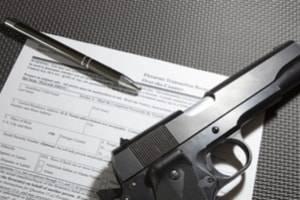DWI Conviction Prohibits Firearms Possession
 Texas has strict requirements for permitting residents to have a license to possess a firearm. Though the second amendment to the U.S. Constitution protects the right to possess firearms, lawmakers believe it is a danger to public safety to allow people convicted of serious crimes to own firearms. Being convicted of a felony or class A or B misdemeanor disqualifies you from having a Texas firearms license for several years. Thus, a conviction for driving while intoxicated will result in your firearms license being revoked.
Texas has strict requirements for permitting residents to have a license to possess a firearm. Though the second amendment to the U.S. Constitution protects the right to possess firearms, lawmakers believe it is a danger to public safety to allow people convicted of serious crimes to own firearms. Being convicted of a felony or class A or B misdemeanor disqualifies you from having a Texas firearms license for several years. Thus, a conviction for driving while intoxicated will result in your firearms license being revoked.
Misdemeanors
A first-time DWI offense without any aggravating factors is a class B misdemeanor. Merely being charged with DWI causes an automatic suspension of your firearms license while your case is ongoing. If you are convicted, your license will be revoked, and you must wait five years to reapply for the license.
A second DWI offense is a class A misdemeanor but could disqualify you from having a firearms license. Texas law states that a person who is twice convicted of a drug or alcohol-related offense within 10 years is considered chemically dependent and ineligible to receive a firearms license.
Felonies
A DWI conviction in Texas is a felony if:
- It is your third DWI conviction;
- You had a child passenger in your vehicle; or
- You caused serious bodily injury or death to another person.
Convicted felons can lawfully own firearms in Texas but with heavy restrictions. You must wait until five years after you have been released from imprisonment or your parole has ended, whichever date is later. Even if you are allowed to own a firearm, your firearms must remain at your residence. Being caught possessing a firearm anywhere else will result in your arrest.
Federal Restrictions
Federal laws can also restrict your ability to legally possess or transport firearms across state lines. However, a U.S. District Court recently ruled one section of the law unconstitutional as applied to a man convicted for a misdemeanor driving under the influence offense in Pennsylvania. In Holloway v. Sessions, the plaintiff argued that a federal law unlawfully prevented him from purchasing a firearm. U.S. law states that a person cannot possess a firearm if he or she was convicted of a crime that included imprisonment for more than a year. The court ruled that the law does not apply to the plaintiff because the defendants did not prove that a misdemeanor DUI conviction means that it is dangerous to allow the plaintiff to own a firearm.
Right to Firearms
It would be difficult to challenge Texas’s laws regarding whether people convicted of crimes should be denied access to firearms. You are more likely to succeed by preventing a DWI conviction. A San Antonio DWI defense attorney at The Law Offices of Sam H. Lock can contest the DWI charge against you. To Schedule your consultation, call 210-226-0965.
Source:
https://statutes.capitol.texas.gov/Docs/GV/htm/GV.411.htm#411.172





